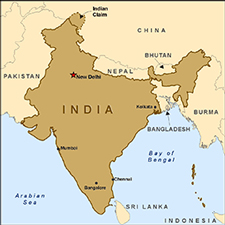redo Jump to...
print Print...
CHINA – 2,000 Foxconn workers involved in mass brawl at China factory
 BEIJING | Armed paramilitary police had to be called in to quell a 2,000-man brawl at the troubled Foxconn factory in Northern China that makes parts for Apple’s iPhone 5, among other products.
BEIJING | Armed paramilitary police had to be called in to quell a 2,000-man brawl at the troubled Foxconn factory in Northern China that makes parts for Apple’s iPhone 5, among other products.
Around 40 workers were hospitalized in the riot, which began at around 11pm on Sunday night in one of the factory’s dormitory blocks.
What started as a dispute between a worker and aggressive security guards in one of the factory dormitories spiralled out of control as thousands of workers streamed off their shifts and joined the fray against the plant’s 1,500 security guards.
It took four hours for the police to bring the situation under control, according to a statement from Foxconn, the owners of the plant in Taiyuan, Shanxi province.
According to accounts from witnesses posted on the Chinese internet, workers from different parts of China battled the security forces and each other, while grievances over pay and working conditions were also aired. The factory’s supermarket was also destroyed.
A video shot on a camera phone showed mostly young male workers shouting and screaming while running across the factory’s campus in the dark.
On Monday, the 79,000-worker factory was shuttered while at least 35 police and paramilitary trucks remained parked outside the front gate.
“The cause of this dispute is under investigation by local authorities and we are working closely with them in this process, but it appears not to have been work-related,” Foxconn said.
The hi-tech plant, which opened in December 2004, primarily makes moulds for manufacturing a range of products, but also engineers alloy components for consumer electronics and mobile phone parts.
INDIA – Leprosy on the rise seven years after disease was ‘eradicated’
 NEW DELHI | Leprosy is increasing in India, seven years after the government claimed it had eliminated it.
NEW DELHI | Leprosy is increasing in India, seven years after the government claimed it had eliminated it.
Indian officials are now planning to triple health spending to halt its return after new figures revealed the number of cases had increased last year for the first time since the disease was officially ‘eradicated’ in 2005.
Campaigners said there are in fact fewer cases today than when the disease was declared to have been eliminated – 169,709 in 2005 compared with 127,200 last year. But the latest figures show an increase of 400 cases on the 2010 figures and have prompted concerns that complacency is fuelling its return.
The disease has returned in greater numbers in some of India’s poorest states including Uttar Pradesh, Maharashtra and Bihar and ignorance has been blamed for delays in new sufferers seeking treatment.
Leprosy is believed to be one of the oldest recorded diseases, with references dating back to Biblical times and medical evidence from skeletons indicating it originated in India in around 2000 BC. Even today India accounts for more than half the world’s leprosy cases.
Because of the continuing stigma surrounding the disease many sufferers in India delay treatment and seek the help of [Hindu] priests before visiting a doctor. “We’re trying to create awareness – there’s a need to report the disease as early as possible. It only needs six months of treatment and it is completely curable. When there are delays, that’s when deformity sets in,” said Mrs Nikita Sarah of the Leprosy Mission Trust India.
FRANCE – France’s most senior Catholic cleric says legalizing same-sex marriage will result in “a complete breakdown of society”
“It is very shocking and even surprising coming from him, because he is someone I consider a wise man,” he said. “I don’t know what came over him, he flipped his lid a little bit and what he said was downright ugly.”
The [disagreement] has erupted as French President Francois Hollande’s Socialist government draws up a bill legalizing same-sex marriages and adoptions by homosexual couples, to be presented to the French parliament on October 24.
Speaking to RCF Christian radio over the weekend, following talks on the legislation with Manuel Valls, the French interior minister, Cardinal Barbarin warned that gay marriage would herald a complete “breakdown in society.”
“This could have innumerable consequences. Afterward they will want to create couples with three or four members. And after that, perhaps one day the taboo of incest will fall,” he said.
“The first page of the bible, which says that marriage unites a man and a woman, has more force and truth, crossing cultures and centuries, than incidental or transient decisions made by a parliament. This is a choice of the government with which we do not agree.”
Bishop Dominique Rey, the Bishop of Fréjus-Toulon, has demanded a popular vote on gay marriage as the conflict escalates unto the worst split between church and state for over a decade.
“A referendum must be held to allow a real debate and to make sure the government is not in the grip of the lobbies,” he said. “A majority of the population agrees with the traditional view of marriage.”
(The news briefs above are from wire reports and staff reports posted at London’s Daily Telegraph on Sept. 24, Sept. 19 and Sept. 17.)
Questions
1. For each of the 3 countries, give the following information:
a) location/the countries that share its borders
b) the religious breakdown of the population
c) the type of government
d) the chief of state (and head of government if different) [If monarch or dictator, since what date has he/she ruled? – include name of heir apparent for monarch]e) the population
Background
CHINA
The Foxconn plant in Taiyuan, Shanxi province has had a troubled history. Workers went on strike in March over pay, and in the run-up to the release of the iPhone 5, a Chinese newspaper exposed a series of poor working practices.
The Shanghai Evening Post sent one of its reporters undercover into the Taiyuan factory, where he trained for seven days and then spent three days on the factory floor assembling the new iPhone’s metal “back plates.”
He wrote: “The whole dormitory smelled like rubbish [garbage] when I entered.”
There was uncleared rubbish outside every room. Cockroaches crawled out from my [closet] and the bedsheets are dirty with ash. All the windows are barred.”
He reported that workers were fired if they were found to be carrying any metallic objects, and that workers had to sit still while working.
“This is the new iPhone 5 back plate, you should be honoured to have the chance to make it,” his supervisor told him, and he was given the job of marking his back plates with a pen.
“An iPhone 5 back-plate passed in front of me almost every three seconds. I had to pick up the back plate and mark four points using the oil-based paint pen. Every ten hours, I had to finish 3,000 back plates. After several hours, I had terrible neck pain,” he wrote.
Foxconn admitted to the Shanghai Evening Post that “the working environment on the production line can be improved” and promised to investigate the problems. “We are not perfect but we are improving every day,” it added.
On Monday a Foxconn spokesman declined to comment on whether the Taiyuan facility made parts for the iPhone 5 but said that it supplied goods to many consumer electronics brands.
According to the Shanghai Daily newspaper, schools in Huai’an in Jiangsu province were asked by the Chinese government to send their students to “intern” at Foxconn for 1,550 yuan ($244) a month.
Demand for the iPhone 5 is so high that one Foxconn factory, in Zhengzhou, Henan province, had to recruit an additional 200,000 workers and turned to the local government for help. (from the Telegraph article)
Daily “Answers” emails are provided for Daily News Articles, Tuesday’s World Events and Friday’s News Quiz.




